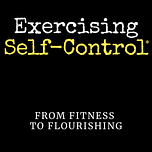Maybe you can relate to this hypothetical: You’ve decided to start exercising first thing in the morning. You set your alarm for 5 AM, telling yourself “I HAVE to get up and work out.”
The alarm goes off and what happens? The first couple of mornings, you follow through. On the third day you hit snooze, feeling guilty and frustrated, while coming up with reasonable excuses for failure. Sound about right?
Most people struggle with lasting change because they think it requires force. They fight against their nature instead of working with it.
Today we’ll explore how you can transform your personal development strategy so you change using power not force.
Hey there. It’s me, Kore. And you’re listening to Exercising Self-Control: From Fitness To Flourishing.
The Problem with Force
When we try to force behavioural change it’s like we’re swimming against the current. No matter how strong we get, the current will continue flowing against us. And as soon as we try to coast, we get washed along in the opposite direction. Force creates internal conflict because we’re not flowing with our own natural processes.
Think about the language we use:
“I HAVE to work out.”
“I SHOULD eat better.”
“I MUST wake up earlier.”
This “have to” mindset is actually working against you. When you think “I have to,” you’re essentially saying “but if I had my way, I’d do something else.” And this is the crucial part: your brain takes that message and starts imagining ways to avoid whatever you “have to” do.
It’s like saying, “Hey, Brain. Can you come up with a bunch of better stuff to do than this?” Your brain says, “I’m on it! Here’s a list…”
You’re pitting two competing brain processes against each other. And as Emile Coué, a French psychologist, hypnotist, and author of Self-Mastery Through Auto-Suggestion, put it:
When the will and the imagination are antagonistic, it is always the imagination which wins, without any exception.
Regular Imagination vs Hypnotic Imagination
He’s talking about what I call Hypnotic Imagination. With what I call Regular Imagination you distinguish between what you accept as reality and what you are consciously imagining. In other words you are aware you’re “making it up” or that “I’m imagining this.”
However, with Hypnotic Imagination you experience what you are non-consciously imagining as reality without questioning it. In other words, you act on what your brain is providing as if it’s fact. You’re consciously unaware that your brain is “making it up.” You think “This is happening. This is real.” And you act from that understanding.
The brain supplies these Hypnotically Imaginative interpretations automatically without any prompting based on our past conditioning (i.e. our past experiences and past conclusions). It’s the Conditioned Self doing its best to be helpful. Or not so helpful depending on your experience. We need the presence of mind to question that interpretation consciously to dig further for the truth.
For example, a friend walks past you with their brows furrowed, a down-turned mouth, makes eye contact but doesn’t say “Hello” as they walk past. Your brain provides this before you can blink: “They’re mad at you about that thing you said at the meeting.” And just like that your Hypnotic Imagination is off and running with those “facts.”
Photo by OSPAN ALI
That flash of non-conscious thought may be completely false. Perhaps they just got some bad news at the end of the meeting and don’t want to share it until they’ve processed it for themselves. Or something else entirely.
If we took a moment to question that interpretation we could distinguish between what we observed and what’s actually going on. With one possibility being we have no idea and need to ask further questions.
Epictetus, the ancient Stoic teacher, put it like this:
[In this translation the word ‘impression’ is used where I’ve used ‘interpretation’.]
If you muster these thoughts against it, you’ll overpower your impression and not be swept away by it. But first of all, don’t allow yourself to be dazed by the rapidity of the impact, but say, ‘Wait a while for me, my impression, let me see what you are, and what you’re an impression of; let me test you out.’ And then don’t allow it to lead you on by making you picture all that may follow, or else it will take possession of you and conduct you wherever it wants. But rather, introduce some fine and noble impression in place of it, and cast out this impure one. If you get into the habit of carrying out such exercises, you’ll see what shoulders you’ll develop, and what muscles, and what strength.
- Epictetus. Discourses, Fragments, Handbook (trans. Robin Hard)
With that taken care of let’s get back on track.
The Natural Alternative For Personal Change
Instead of trying to force yourself to change, you can choose to change and have it unfold naturally. The difference comes down to two simple words:
Instead of “I HAVE to,” use “I CHOOSE to.”
When you think “I choose to wake up at 5 AM,” your brain asks “Why?” And here’s the best part, your brain will find those reasons. Those reasons may evolve as your experience of change progresses. And that’s okay. That’s growth.
Some reasons might be:
“I choose to wake up early because I value feeling energized all day.”
“I choose to wake up early because I want to model good habits for my kids.”
“I choose to wake up early because it aligns with who I’m becoming.”
Now your imagination and will are working together instead of against each other. You’re imagining ways to succeed at something you’ve chosen, both consciously and non-consciously, rather than ways to escape something you’re forcing yourself to do.
The Science Behind It
Neuroscientific research supports this approach. Our brains more readily adopt changes that align with our identity rather than conflict with it. When you choose a behaviour, you’re not just changing what you do, you’re evolving who you are.
This isn’t just positive thinking. It’s about working with your brain’s natural tendency to move toward what you focus your attention on and with what you identify.
Try This Now
Here’s your three-step framework to implement this right now:
Step 1: Identify one behaviour you’ve been trying to force. Notice any “I have to” or “I should” language around it.
Step 2: Reframe it as a choice with a reason. Complete this sentence: “I choose to [preferred behaviour] because I value [preferred outcome or identity].”
Step 3: For the next week, whenever you catch yourself in “have to” mode, consciously shift to “choose to” and remind yourself why.
If “I choose to” feels too strong of an attitude at first, that’s normal. If you want start with “I’m willing to explore this [preferred behaviour] because I value [preferred outcome or identity]” and build from there.
Skeptical?
Now, this might sound too simple. Simple doesn’t mean easy. It means sustainable and doable. You’re not trying to muscle through with willpower. You’re aligning your actions with your chosen identity and letting natural behaviour change emerge. This isn’t drummed up motivation. The motivation you’ll feel comes with the thinking, naturally.
This Is Your Only Responsibility
Here’s what I want you to focus on: Your only responsibility is to imagine yourself being the person you want to be and experiencing the life you want to live. This is your Intention. It’s up to you, and yours to choose, whatever the circumstances.
Imagine yourself into new behaviours and circumstances. Don’t concern yourself with how you’ve acted in the past or how you’ll act tomorrow. Focus on imagining how you want to act now, in this moment. You can only ever act in the present moment. That’s where your attention belongs.
There may be discomfort as you adapt to new circumstances but there doesn’t have to be tension or stress. Discomfort from growth is different from resistance to being forced.
Fueling Natural Change
The next time you catch yourself saying “I have to” pause and ask: “What if I chose to do this? And why would I choose that?”
Your brain may surprise you with the answers. And those answers become the fuel for natural, sustainable change.
Remember: Change happens most naturally when it feels like a choice rather than a duty with no option. Try this perspective for one week and notice what happens. I think you’ll discover it’s a much more effective means of personal transformation. You won’t be using force. You’ll be choosing.
As always this choice is up to you.
That’s it for today. Catch you next time.












